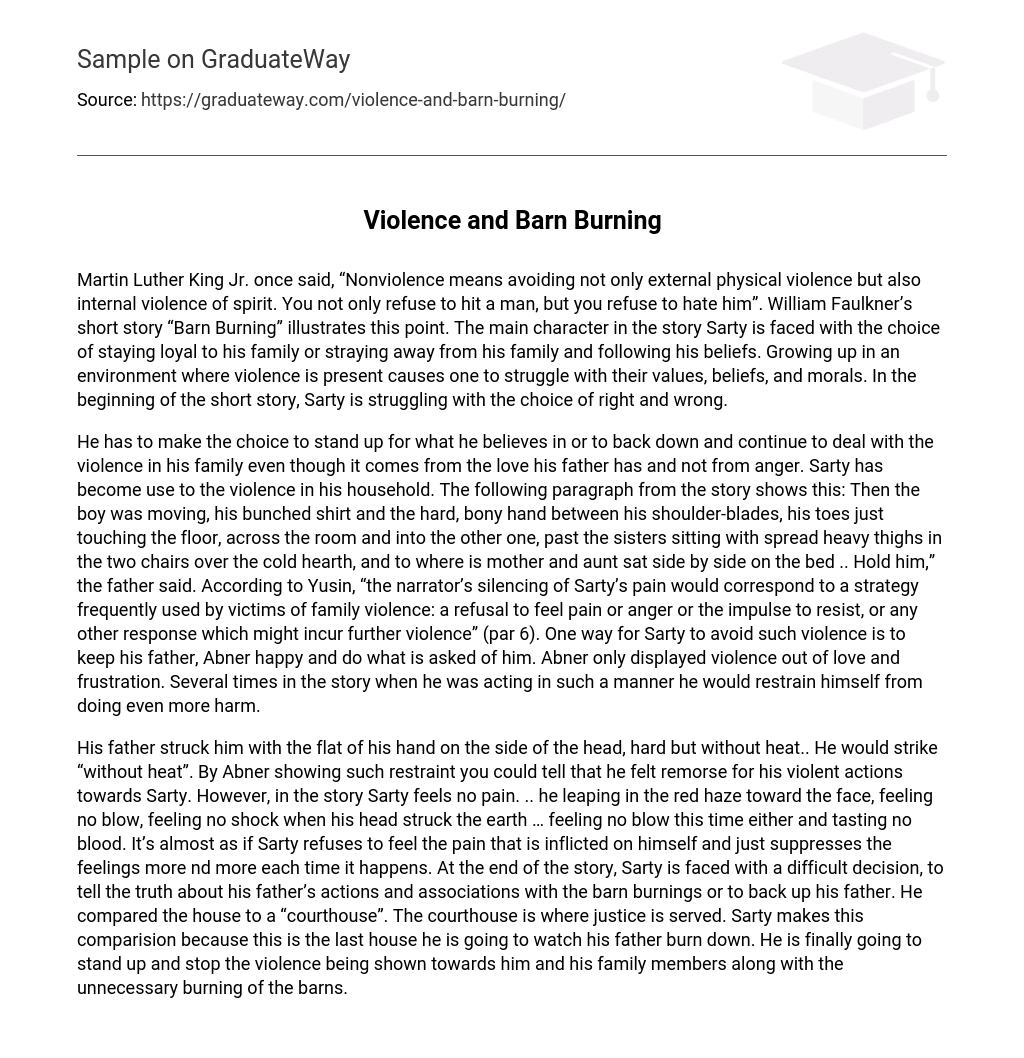Martin Luther King Jr. once said, “Nonviolence means avoiding not only external physical violence but also internal violence of spirit. You not only refuse to hit a man, but you refuse to hate him”. William Faulkner’s short story “Barn Burning” illustrates this point. The main character in the story Sarty is faced with the choice of staying loyal to his family or straying away from his family and following his beliefs. Growing up in an environment where violence is present causes one to struggle with their values, beliefs, and morals. In the beginning of the short story, Sarty is struggling with the choice of right and wrong.
He has to make the choice to stand up for what he believes in or to back down and continue to deal with the violence in his family even though it comes from the love his father has and not from anger. Sarty has become use to the violence in his household. The following paragraph from the story shows this: Then the boy was moving, his bunched shirt and the hard, bony hand between his shoulder-blades, his toes just touching the floor, across the room and into the other one, past the sisters sitting with spread heavy thighs in the two chairs over the cold hearth, and to where is mother and aunt sat side by side on the bed .. Hold him,” the father said. According to Yusin, “the narrator’s silencing of Sarty’s pain would correspond to a strategy frequently used by victims of family violence: a refusal to feel pain or anger or the impulse to resist, or any other response which might incur further violence” (par 6). One way for Sarty to avoid such violence is to keep his father, Abner happy and do what is asked of him. Abner only displayed violence out of love and frustration. Several times in the story when he was acting in such a manner he would restrain himself from doing even more harm.
His father struck him with the flat of his hand on the side of the head, hard but without heat.. He would strike “without heat”. By Abner showing such restraint you could tell that he felt remorse for his violent actions towards Sarty. However, in the story Sarty feels no pain. .. he leaping in the red haze toward the face, feeling no blow, feeling no shock when his head struck the earth … feeling no blow this time either and tasting no blood. It’s almost as if Sarty refuses to feel the pain that is inflicted on himself and just suppresses the feelings more nd more each time it happens. At the end of the story, Sarty is faced with a difficult decision, to tell the truth about his father’s actions and associations with the barn burnings or to back up his father. He compared the house to a “courthouse”. The courthouse is where justice is served. Sarty makes this comparision because this is the last house he is going to watch his father burn down. He is finally going to stand up and stop the violence being shown towards him and his family members along with the unnecessary burning of the barns.
Sarty’s has, by an act of his own will, turned from a primitive bond (the supposed blood-bond) toward an abstract mortality which, tends to minimize resentment of those who espouse it (Bertonneau par. 14). An environment where violence is present can cause a person to struggle with their values, beliefs, and morals. Just because someone grows up in an environment where violence is present and is taught to act out in the same manner, doesn’t mean that they can’t modify their behavior to have a different future than that of their role models and peers.





